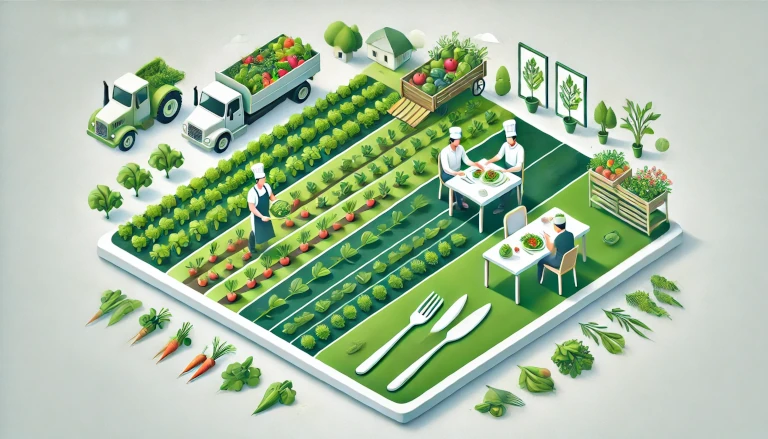The Farm to Fork business model focuses on bringing food directly from farms to consumers, bypassing traditional supply chains such as grocery stores or middlemen. It aims to provide fresh, locally sourced products while supporting sustainable agriculture and reducing the carbon footprint of food production and transportation. As consumer interest in organic, sustainably sourced, and locally grown food rises, this business model has gained significant traction.
Starting a Farm to Fork business offers an excellent opportunity for farmers and entrepreneurs to create a direct link between producers and consumers, while promoting healthy eating and supporting local communities.
Why Start a Farm to Fork Business? 🌱
The Farm to Fork business model brings several advantages both for the producers and the consumers. It ensures freshness, quality, and transparency by reducing the distance food travels from the farm to the consumer’s table. This business model also allows consumers to understand where their food comes from, creating a sense of trust in the food they eat.
Key Benefits of Farm to Fork:
- Fresher Food: Consumers receive fresher produce and meats, as food goes directly from farms to the table, cutting down on processing and transportation time.
- Support for Local Farmers: Buying locally supports farmers, helps them achieve better margins, and strengthens local economies.
- Sustainability: By reducing transportation and storage, this business model lowers the carbon footprint, promoting environmentally friendly practices.
How to Start a Farm to Fork Business? 📝
Starting a Farm to Fork business requires planning and research. Here are the essential steps to launch a successful venture:
- Research the Market: Begin by understanding the local food market. Analyze consumer demand for organic or locally sourced food in your area, and identify your target audience—whether they are urban households, restaurants, or local markets.
- Establish Supplier Relationships: Connect with local farmers who grow fruits, vegetables, dairy, or meat products. Ensure that these farms follow sustainable farming practices and maintain high standards of quality.
- Logistics and Delivery: A key component of the Farm to Fork business is ensuring timely delivery of fresh produce. Set up a logistics plan that includes refrigeration for perishables and a fleet to manage deliveries. Alternatively, some businesses opt for a subscription model where customers receive weekly or bi-weekly deliveries of fresh produce.
- Licensing and Compliance: To legally operate your Farm to Fork business, you will need relevant licenses such as a food business license from the Food Safety and Standards Authority of India (FSSAI). It’s also important to comply with health and safety regulations.
- Build a Website and Marketing Strategy: In today’s digital world, having an online presence is crucial. Create a user-friendly website that highlights your mission, showcases your products, and offers a seamless shopping experience. Use social media platforms to engage with your audience and promote your business.
Where to Operate a Farm to Fork Business? 📍
Farm to Fork businesses can operate in various settings, depending on the location and the type of consumers. Here are some potential markets:
- Urban Areas: In cities, there is growing demand for fresh, organic, and locally sourced food. By setting up a delivery system or partnering with local farmers’ markets, you can meet this demand.
- Community Supported Agriculture (CSA): You can introduce a subscription-based CSA model, where consumers purchase seasonal shares of produce directly from farmers.
- Local Restaurants and Cafes: Partnering with local restaurants and cafes can ensure a consistent demand for fresh produce. Many establishments now prefer sourcing locally as it aligns with sustainability and farm-to-table dining trends.
How Much Does it Cost to Start a Farm to Fork Business? 💸
Starting a Farm to Fork business can be relatively low-cost compared to traditional retail models, but it still requires an initial investment for logistics, infrastructure, and marketing.
- Farm Partnerships: If you already own a farm, your costs will be lower as you’ll only need to manage distribution. However, if you’re sourcing from other farms, you’ll need to negotiate fair pricing.
- Logistics and Transportation: Depending on the scale of your operations, you’ll need delivery vehicles, which may require an initial investment of INR 5 to 10 lakhs for refrigerated trucks or smaller vehicles.
- Technology and Website Development: Setting up an e-commerce platform will involve costs for development, maintenance, and payment gateways.
Advantages of a Farm to Fork Business 🌟
- Healthier and Fresher Food: By cutting down on the time food spends in transit, customers get fresher, more nutritious products.
- Reduced Waste: Since food goes directly from farms to consumers, there is less wastage due to long storage periods or expired stock.
- Better Margins for Farmers: Farmers can sell their products at higher prices, as the need for middlemen is eliminated, allowing them to retain more of the profits.
- Increased Customer Engagement: Consumers can connect directly with the source of their food, enhancing trust and loyalty.
Disadvantages of a Farm to Fork Business ⚖️
- Logistics Challenges: Managing deliveries and ensuring products are fresh upon arrival can be difficult, especially in remote or rural areas.
- Seasonal Limitations: Your business will depend heavily on seasonal produce, which may limit availability and variety during certain times of the year.
- Higher Initial Costs: Depending on the scale of operations, initial investments in infrastructure, delivery systems, and technology can be significant.
Cost Benefits of a Farm to Fork Business 💰
While there are initial costs involved in setting up a Farm to Fork business, the long-term benefits include:
- Lower Supply Chain Costs: Cutting out intermediaries reduces the costs of storing and transporting goods over long distances.
- Stronger Brand Loyalty: Customers who care about food quality and sustainability tend to be loyal and may even pay a premium for fresher, locally sourced products.
- Community Engagement: Supporting local farmers fosters community spirit, and as more consumers become conscious of their food choices, this business model has strong growth potential.
Building a Sustainable Farm to Fork Business 🌾🥗
The Farm to Fork business model offers a unique opportunity to connect local farmers with consumers who are looking for fresher, healthier, and more sustainable food options. With the rising demand for organic and locally sourced food, starting a Farm to Fork business can be a profitable and socially responsible venture. However, the success of your business depends on proper planning, partnerships with trusted farmers, and effective logistics.
Discover more from Green Ecosystem - Renewable Energy, Agriculture, and Environmental Sustainability
Subscribe to get the latest posts sent to your email.


